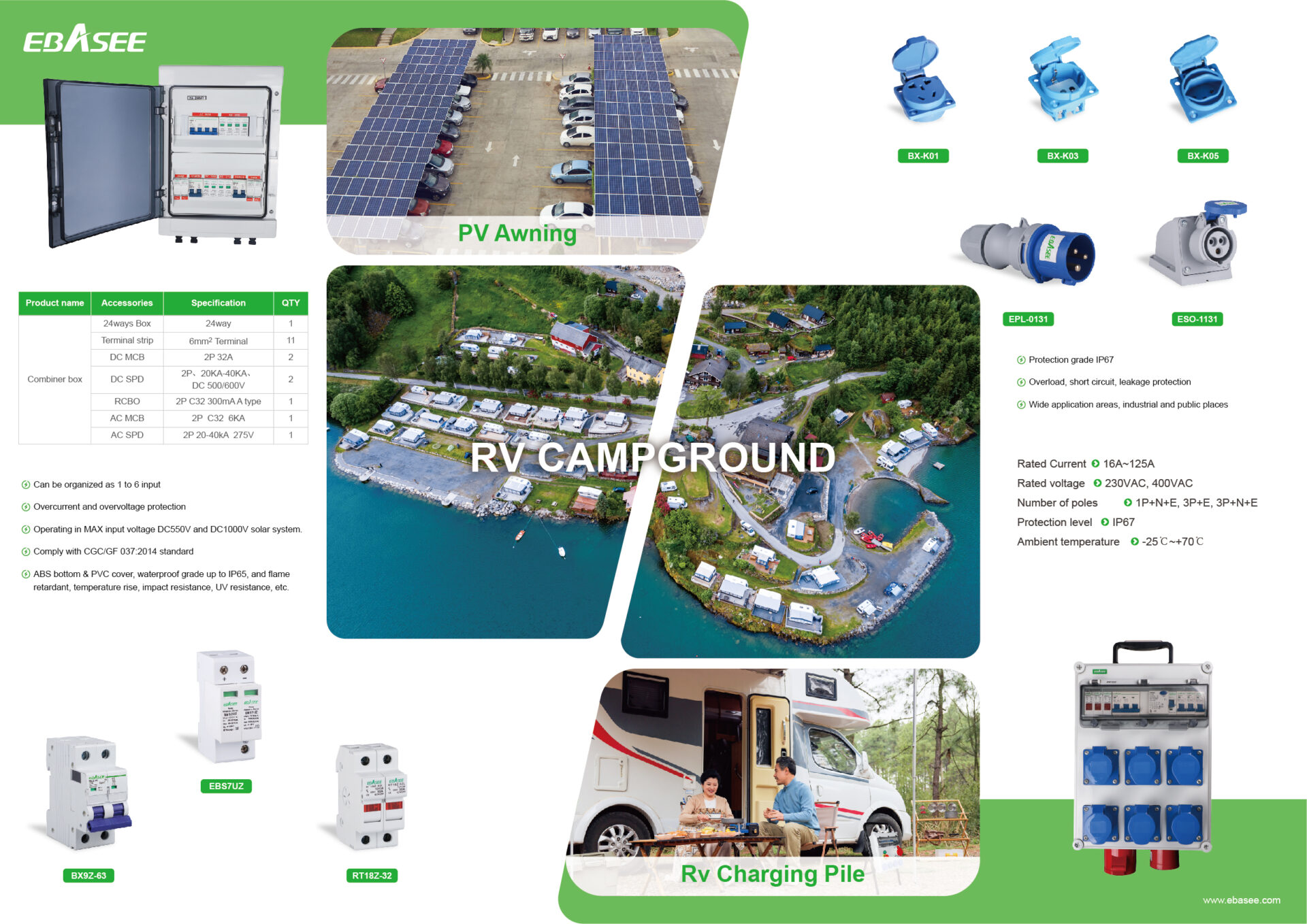
solutions

With the growing popularity of camping and RV travel, the demand for well-equipped RV parks has risen significantly. Among all infrastructure elements, RV electrical hookups and power systems play a central role in ensuring a seamless experience for RV users, maintaining safety, and optimizing energy management. This article explores how to design and implement a professional, reliable electrical solution for RV parks to meet diverse needs.
Key Considerations for RV Park Electrical Systems
The electrical system in an RV park must address several critical factors:
1.Safety: Provide reliable protection against overload and leakage to prevent electrical hazards, such as ground fault protection using RCCBs or RCBOs.
2.Reliability: Ensure stable power supply, even with multiple RVs using electricity simultaneously, supported by robust power distribution systems.
3.Flexibility: Support modular expansion to accommodate park growth and equipment upgrades through modular contactors.
4.Sustainability: Integrate renewable energy sources like solar-powered RV sites to reduce the carbon footprint and operational costs.
Core Components of the Electrical Solution
1.Power Distribution and Protection
Each RV parking space requires a dedicated power distribution and protection system:
Install main distribution boards and sub-distribution boxes for zoned power management and independent control.
Use miniature circuit breakers (MCBs) and residual current circuit breakers (RCCBs) to protect against overloads and electrical leakage.
Integrate intelligent power distribution systems for real-time monitoring and fault alerts, enhancing safety and reliability.
2.Charging Stations and Power Interfaces
RV parks must provide stable power interfaces for charging onboard systems and batteries:
Deploy AC charging stations and DC fast chargers to meet diverse charging needs, addressing modern RVs' growing power demands.
Install smart billing systems supporting time- or consumption-based pricing for easier management and revenue tracking.
Use surge protection devices (SPDs) to prevent damage from voltage surges or lightning strikes, ensuring safety during unexpected events.
3.Lighting and Power for Public Facilities
Public areas, such as pathways, restrooms, and recreation zones, require efficient lighting and power supply:
Equip lighting distribution boxes for centralized management of public area lighting.
Use energy-efficient LED fixtures to reduce power consumption.
Implement timed or motion-controlled lighting for smart energy management, enhancing user experience and energy savings.
4.Renewable Energy Systems
Incorporating renewable energy helps RV parks reduce grid dependence and meet sustainability goals:
Install solar panels and DC combiner boxes to harness solar power efficiently.
Configure energy storage systems and inverters to ensure stable power supply during nighttime or peak demand.
Integrate with smart grids for multi-source energy management, creating a future-proof energy system.
5.Intelligent Monitoring and Management
An effective RV park electrical system requires smart management tools for improved efficiency:
Deploy intelligent power management platforms for real-time monitoring, data analytics, and optimization.
Include remote-control modules like modular contactors for convenient operation.
Offer a user-friendly app for RV owners to monitor power usage and control devices, improving user satisfaction.
Key Advantages of the Solution
1.Safe and Reliable: High-quality components like RCCBs and SPDs maximize safety for users and equipment.
2.Efficient and Smart: IoT-enabled campground systems optimize energy distribution and reduce maintenance costs.
3.Green and Sustainable: Renewable energy integration, including solar-powered RV sites, supports environmental goals and lowers emissions.
4.Flexible and Scalable: Modular design and customized RV power stations ensure adaptability for future expansion.
Real-World Applications
Several RV parks have successfully implemented these solutions:
A large RV park installed solar energy systems and storage batteries, achieving energy self-sufficiency and saving 30% on electricity costs annually.
Another park optimized user experience and reduced operational expenses by 20% with an intelligent energy management platform.
Parks utilizing weather-resistant power stations have significantly improved equipment longevity and reliability.
Conclusion
Electrical solutions for RV parks are not just part of the infrastructure; they are critical to enhancing user experience and the park’s competitiveness. By focusing on safety, intelligence, and renewable energy, a comprehensive electrical solution can create value for both operators and RV travelers.
If you are planning to build or upgrade your RV park’s electrical system, consult a professional supplier to customize a solution tailored to your needs. Together, let’s create a safe, comfortable, and eco-friendly camping experience.
About Us
We specialize in the development and manufacturing of low-voltage electrical products, including circuit breakers, lighting distribution boxes, modular contactors, and surge protection devices. Our solutions are widely used in RV parks, industrial facilities, and residential projects, including solar-powered systems and smart grids.
For customized solutions, feel free to contact us!